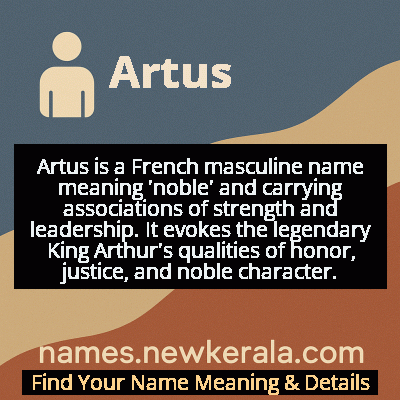Artus Name Meaning & Details
Origin, Popularity, Numerology Analysis & Name Meaning of Artus
Discover the origin, meaning, and cultural significance of the name ARTUS. Delve into its historical roots and explore the lasting impact it has had on communities and traditions.
Name
Artus
Gender
Male
Origin
French
Lucky Number
7
Meaning of the Name - Artus
Artus is a French masculine name meaning 'noble' and carrying associations of strength and leadership. It evokes the legendary King Arthur's qualities of honor, justice, and noble character.
Artus - Complete Numerology Analysis
Your Numerology Number
Based on Pythagorean Numerology System
Ruling Planet
Neptune (Ketu)
Positive Nature
Intuitive, analytical, spiritual, and inquisitive.
Negative Traits
Secretive, reserved, aloof, and can be overly critical.
Lucky Colours
Green, yellow.
Lucky Days
Monday.
Lucky Stones
Cat’s eye, moonstone.
Harmony Numbers
1, 5, 6.
Best Suited Professions
Scientists, researchers, spiritual leaders, detectives.
What People Like About You
Depth of knowledge, analytical skills, spirituality.
Famous People Named Artus
Artus Gouffier de Boissy
French nobleman and statesman
Tutor and close advisor to King Francis I of France, served as Grand Master of France
Artus Quellinus the Elder
Flemish sculptor
Leading Baroque sculptor known for his work on Amsterdam Town Hall (now Royal Palace)
Artus Wolffort
Flemish painter
Notable Baroque painter and teacher of prominent Flemish artists
Artus de Penguern
French filmmaker
Award-winning French director and screenwriter known for his innovative documentary work
Name Variations & International Equivalents
Click on blue names to explore their detailed meanings. Gray names with will be available soon.
Cultural & Historical Significance
The name carries particular significance in Brittany and Normandy, regions with strong Celtic connections where Arthurian legends remained especially vibrant. During the Renaissance, French nobility often adopted the name Artus to evoke the chivalric ideals of the Arthurian court. The name's persistence in French aristocracy throughout the centuries reflects its enduring association with nobility, leadership, and cultural sophistication, making it a symbol of French romantic and historical identity. The cultural legacy of Artus continues to influence French literature, art, and naming traditions, maintaining its status as a name that connects modern France with its rich medieval past.
Extended Personality Analysis
Individuals named Artus are typically perceived as possessing natural leadership qualities combined with a strong sense of integrity and honor. They often exhibit a calm, thoughtful demeanor that masks an inner strength and determination, much like the legendary King Arthur who patiently pulled the sword from the stone. This combination of quiet confidence and moral conviction makes them natural leaders who inspire trust and loyalty in others.
Artus bearers are often characterized by their chivalrous nature, showing courtesy and respect in their interactions while maintaining a protective instinct toward those they care about. They tend to be strategic thinkers who approach challenges with careful consideration rather than impulsive action. Their personality often blends intellectual depth with practical wisdom, making them excellent problem-solvers and mediators. While they may appear reserved initially, they possess deep emotional intelligence and form strong, lasting bonds with a select circle of trusted companions. The name suggests someone who values tradition and principle but adapts these values to modern contexts with intelligence and grace.
Modern Usage & Popularity
In contemporary France, Artus remains a distinguished but relatively uncommon choice, often selected by parents seeking a name with historical depth and noble connotations without being overly popular. The name has maintained a steady, though modest, presence in French birth records, particularly among families with aristocratic backgrounds or those valuing traditional French names. Recent years have seen a slight resurgence as part of the broader trend toward vintage and historically significant names, though it remains far less common than its English counterpart Arthur. The name is particularly favored in regions with strong historical connections to Brittany and Normandy, where Celtic and medieval influences remain culturally significant. While not among the top 100 names in France, Artus maintains a consistent presence that reflects its enduring appeal as a classic French name with noble associations.
Symbolic & Spiritual Meanings
Symbolically, Artus represents the ideal of righteous leadership and moral authority, drawing directly from the Arthurian legend's themes of unity, justice, and noble governance. The name carries connotations of the bear (from Celtic 'artos'), symbolizing strength, protection, and wilderness wisdom. It embodies the concept of the philosopher-king who balances power with wisdom and compassion. The Round Table symbolism associated with the name suggests equality, fellowship, and the pursuit of collective good over individual glory. In modern interpretation, Artus represents the integration of traditional values with contemporary leadership, serving as a metaphor for individuals who uphold principles of honor and service while navigating complex modern challenges. The name symbolizes the enduring human quest for moral leadership and the balance between strength and compassion in personal and professional realms.

